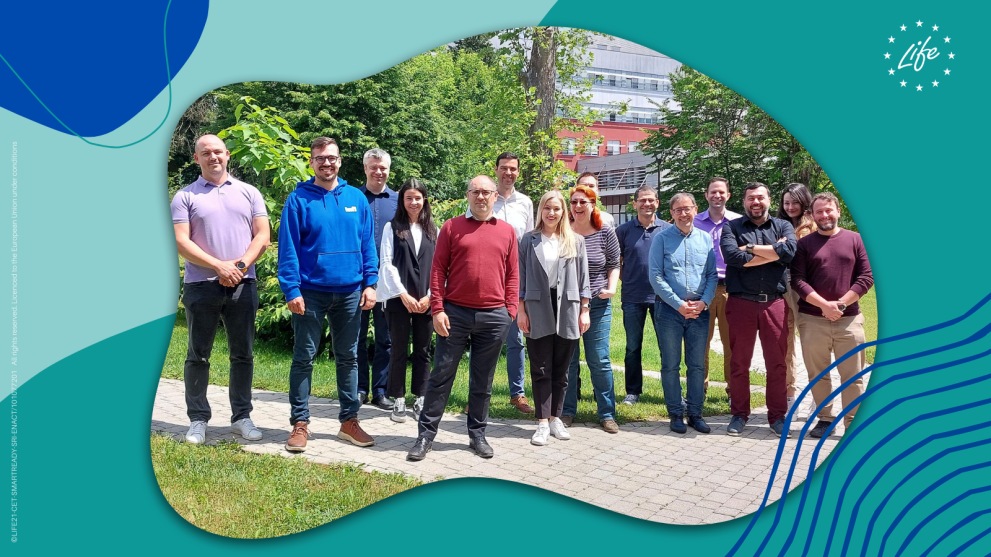
Europe is home to thousands of significant historical and architectural buildings, from Gothic spires to medieval squares, modern towers, and everything in between. Almost 75% of the continent’s buildings are energy inefficient, or ‘leaky’; and over 85% will still be in use by 2050 – the target year for Europe to reach net zero emissions. Upgrading them is a matter of climate change resilience.
Smart readiness is a score and class calculated by a building’s energy performance, comfort and well-being, and energy flexibility. A new EU instrument, the Smart Readiness Indicator (SRI), has been implemented to assess buildings across nine areas: heating, cooling, domestic hot water, ventilation, lighting, dynamic building envelope, electricity, electric vehicle charging, monitoring and control. The performance of each is assessed against energy efficiency, maintenance and fault prediction, comfort, convenience, health, wellbeing and accessibility, information to occupants, and energy flexibility and storage. The SRI is currently being tested in Austria, Croatia, Czechia, Denmark, Finland, France, Germany, Slovenia, and Spain, with the support of the LIFE Clean Energy Transition (CET) sub-programme.
Four LIFE CET projects are supporting the roll out of SRI – EasySRI, Smart Square, SRI2MARKET, and SRI-ENACT – by helping countries plan national SRI rollouts, providing valuable insights, data, and a roadmap for SRI calculation standardisation and tooling, and raising awareness.
To start the smart process, the rolling out of SRI cannot be done without successful planning and route maps for national authorities, and the integration of SRI into national regulations. SRI2MARKET showcases the successes and obstacles of testing phases in Austria and France so other interested countries can learn and plan accordingly the rollout of the SRI in their national markets. It helps design and implement test phases and deployments and lays the groundwork for why nations should adopt SRI methods.
At six sites around Europe, EasySRI is being demonstrated, from smart houses to university auditoriums, office buildings, and laboratories. The project features an extendable web platform to calculate SRI and provide customised recommendations for upgrades. It will promote the adoption of smart measures, engage stakeholders in upgrading their facilities, and run workshops and training programmes. It will also navigate the complex market of smart standards, by investigating the links with energy performance certificates (EPCs), digital building logbooks (B-Logs) and renovation passports. These links could boost the inclusion of SRI in EU policies across energy and buildings.
Ever wondered what ‘energy efficiency’ sounds like in 24 languages? In Slovenian, it is ‘energetska učinkovitost’. Smart Square, or Smart Tools for Smart Buildings, is delivering a cloud based open platform for assessing the intelligence of buildings, available in all EU official languages. The project will develop an audit process, use real-time data, integrate SRI into digital logbooks for the buildings being assessed, and issue over 10 000 SRI certificates.
The success of SRI implementation needs skilled and knowledgeable stakeholders and practitioners, and the training of future auditors. Such is the remit of SRI-ENACT which engages stakeholders to understand the barriers of implementing SRI across national borders. The project will develop a toolkit about the SRI methodology, test its solution on 1 200 buildings, replicate SRI pilot programmes, and provide training for new SRI auditors. In collaboration with SRI2MARKET, 200 to 250 buildings will be assessed, and 200 to 250 experts will be trained in Croatia by the end of 2025. A training package, featuring three modules and a guidebook, available online, will be applied in Austria, Bulgaria, Croatia, Czechia, Greece, Latvia, Romania, and Spain, involving 120 SRI auditors for the SRI assessment of 1 200 buildings.
Speaking on the progress of SRI-ENACT, “Our new online tool for assessing and calculating the SRI has been tested and is now optimised for external and public use. In the coming months, we look forward to recruiting experienced energy professionals to become certified SRI auditors through our training and certification programme,” said Boris Njavro, Consultant at Blueprint Energy, part of SRI-ENACT’s work in Austria.
These projects established the LIFE CET SRI cluster in November 2022 to find synergies between their developments and SRI policy implementation. For more information, read about the latest activities in the cluster’s 2023 report.
Details
- Publication date
- 26 March 2024
- Author
- European Climate, Infrastructure and Environment Executive Agency

